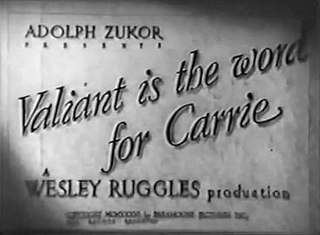
Valiant Is the Word for Carrie is a 1936 American drama film directed by Wesley Ruggles and written by Claude Binyon, based on the 1935 novel of the same name by Barry Benefield. The film stars Gladys George, Arline Judge, John Howard, Dudley Digges, Harry Carey, and Isabel Jewell.

Dame Agnes Sybil Thorndike, Lady Casson was an English actress whose stage career lasted from 1904 to 1969.

Madge Dorita Sinclair CD was a Jamaican actress best known for her roles in Cornbread, Earl and Me (1975), Convoy (1978), Coming to America (1988), Trapper John, M.D. (1980–1986), and the ABC TV miniseries Roots (1977). Sinclair also voiced the character of Sarabi, Mufasa's mate and Simba's mother, in the Disney animated feature film The Lion King (1994). A five-time Emmy Award nominee, Sinclair won the Primetime Emmy Award for Outstanding Supporting Actress – Drama Series for her role as "Empress" Josephine in Gabriel's Fire in 1991.

William Brian de Lacy Aherne was an English actor of stage, screen, radio and television, who enjoyed a long and varied career in Britain and the United States.
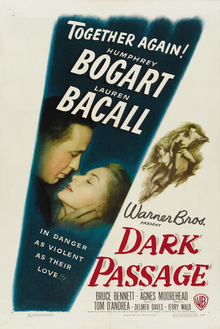
Dark Passage is a 1947 American film noir directed by Delmer Daves and starring Humphrey Bogart and Lauren Bacall. The film is based on the 1946 novel of the same title by David Goodis. It was the third of four films real-life couple Bacall and Bogart made together.

Lucile Watson was a Canadian actress, long based in the United States. She was "famous for her roles of formidable dowagers."
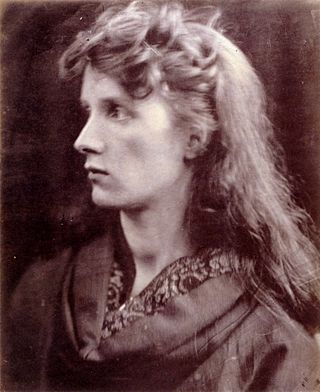
"Lady Clara Vere de Vere" is an English poem written by Alfred Tennyson, part of his collected Poems published in 1842. The poem is about a lady in a family of aristocrats, and includes numerous references to nobility, such as to earls or coats of arms. One such line from the poem goes, "Kind hearts are more than coronets, and simple faith than Norman blood." This line gave the title to the film Kind Hearts and Coronets. Lewis Carroll's poem "Echoes" is based on "Lady Clare Vere de Vere".

The Locket is a 1946 American psychological thriller film noir directed by John Brahm, starring Laraine Day, Brian Aherne, Robert Mitchum, and Gene Raymond, and released by RKO Pictures. The film is based on a screenplay by Sheridan Gibney, adapted from "What Nancy Wanted" by Norma Barzman, wife of later-blacklisted writer Ben Barzman. It is noted for its complex and confusing use of layered flashbacks within flashbacks to give psychological depth to the narrative.

Monsieur Beaucaire is a romantic opera in three acts, composed by André Messager. The libretto, based on the 1900 novel by Booth Tarkington, is by Frederick Lonsdale, with lyrics by Adrian Ross. The piece premiered at the Prince of Wales Theatre in Birmingham, England, on 7 April 1919, before opening at the Prince's Theatre in London under the management of Frank Curzon on 19 April 1919 and transferring to the Palace Theatre on 29 July 1919, for a successful run.

Sheila Carter is a fictional character from The Young and the Restless and The Bold and the Beautiful, American soap operas on the CBS network. Created by William J. Bell, the role was introduced in 1990 — by Edward J. Scott — under the portrayal of Kimberlin Brown, who portrayed the role from 1990 to 1992 on The Young and the Restless, although she continued to make guest appearance until 1995. From 1992 to 1998, Brown played the role on The Bold and the Beautiful, returning for stints in 2002 and 2003, before returning to The Young and the Restless from 2005 to January 2006. That same year, Michelle Stafford took over the role after Sheila had plastic surgery to look like Phyllis Summers. Brown returned to the role of Sheila on The Bold and the Beautiful from June 9, 2017, to March 23, 2018, and then again from August 6, 2021.
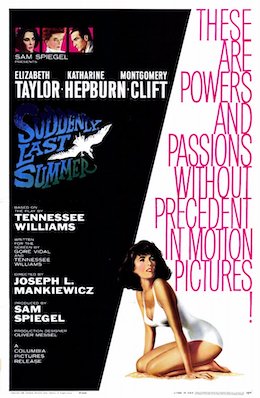
Suddenly, Last Summer is a 1959 Southern Gothic psychological drama mystery film based on the 1958 play of the same name by Tennessee Williams. The film was shot in England and Spain. It was directed by Joseph L. Mankiewicz and produced by Sam Spiegel from a screenplay by Gore Vidal and Williams with cinematography by Jack Hildyard and production design by Oliver Messel. The musical score was composed by Buxton Orr, using themes by Malcolm Arnold.

Fires of Rebellion is a 1917 American silent drama film written and directed by Ida May Park, and starring Lon Chaney, William Stowell, and Dorothy Phillips. The film is today considered lost. A still exists showing Lon Chaney in the role of the lecherous photographer Russell Hanlon. The film's main musical theme was Serenade by R. Czerwonky.

What Every Woman Knows is a four-act play written by J. M. Barrie. It was first presented by impresario Charles Frohman at the Duke of York's Theatre in London on 3 September 1908. It ran for 384 performances, transferring to the Hicks Theatre between 21 December 1908 and 15 February 1909.

The Lady in Question is a 1940 American comedy-drama romance film directed by Charles Vidor and starring Brian Aherne, Rita Hayworth and Glenn Ford. It is a remake of the 1937 French film Gribouille.
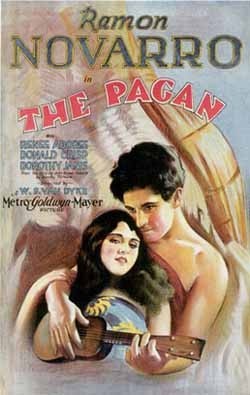
The Pagan is a 1929 synchronized sound romantic drama filmed in Tahiti and produced and distributed by Metro Goldwyn Mayer. While the film has no audible dialog, it was released with a synchronized musical score with sound effects using both the sound-on-disc and sound-on-film process. Both director W.S. Van Dyke and cinematographer Clyde De Vinna had previously visited Tahiti in 1928 to film White Shadows in the South Seas. The Pagan stars Ramón Novarro.
What Every Woman Knows is a 1917 British comedy drama film directed by Fred W. Durrant and starring Hilda Trevelyan, Madge Tree and Maud Yates. It is an adaptation of the 1908 play What Every Woman Knows by J.M. Barrie. American versions were filmed in 1921 and 1934.

What Every Woman Knows is a 1921 American silent comedy-drama film adapted form the play What Every Woman Knows by James Barrie. The play had premiered on Broadway in 1908 and was a hit starring Maude Adams. A British silent film version had been made in 1917 and a later American talkie would be produced in 1934 with Helen Hayes. This silent film version was directed by William C. deMille continuing his forte at adapting literary and/or stage plays to the silent screen. The film stars Lois Wilson and Conrad Nagel. This version is now lost.

The Thirteenth Chair is a 1937 American mystery film directed by George B. Seitz and starring Dame May Whitty, Lewis Stone, Madge Evans, and Elissa Landi. It is based on the 1916 stage play of the same title by Bayard Veiller. This was the third film adaptation of the play. There was an earlier version by director Tod Browning in 1929, with Bela Lugosi in a supporting role, and an even earlier 1919 silent film adaptation that starred Creighton Hale.
Pact with the Devil, known in Canada as Dorian, is a 2004 Canadian-British drama film directed by Allan A. Goldstein and starring Ethan Erickson, Malcolm McDowell and Christoph Waltz. It is a modern retelling of the Oscar Wilde novel The Picture of Dorian Gray. It was filmed in 2002 in Canada.
Josephine Ann Maxwell-Muller was a British actress.
















